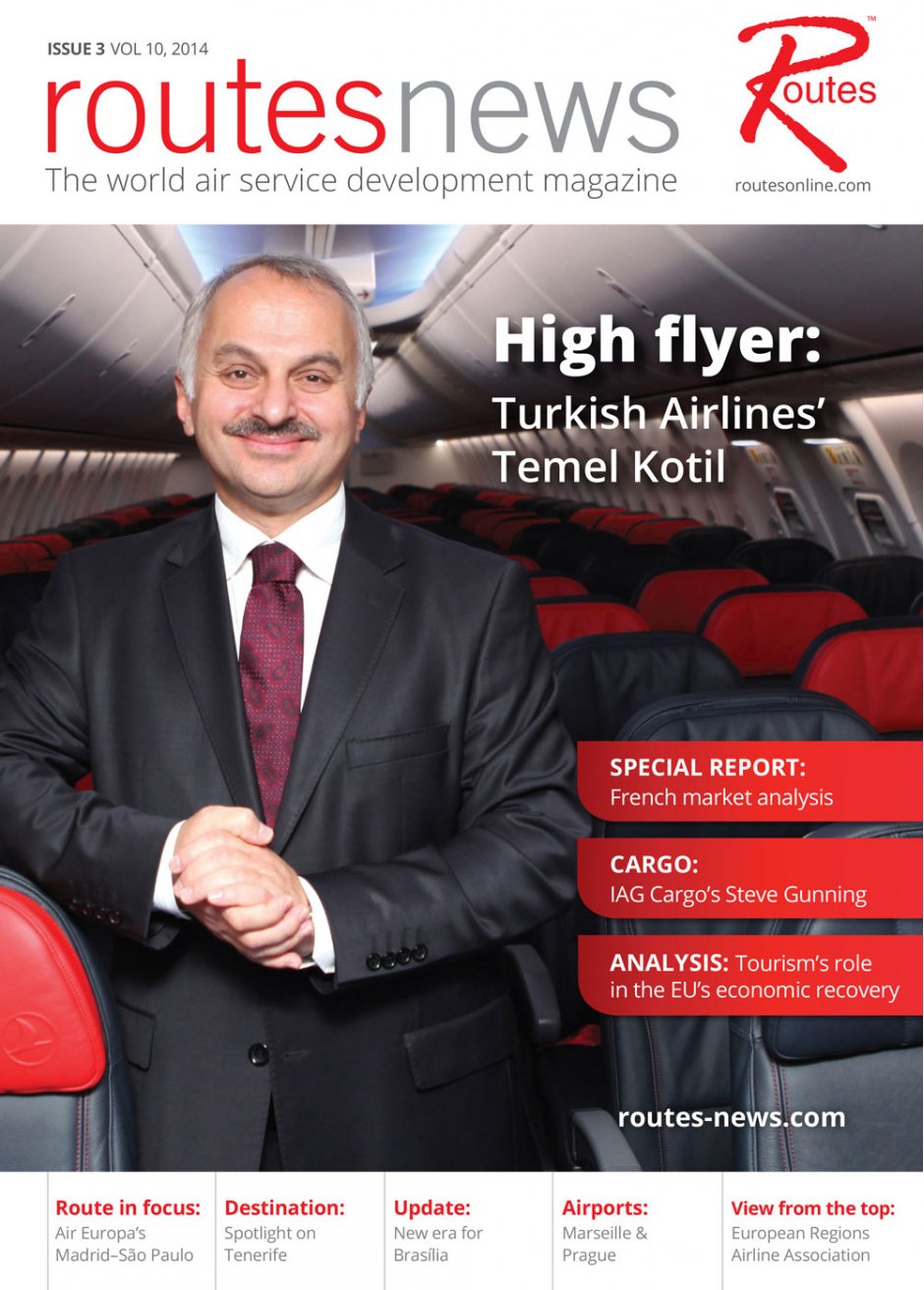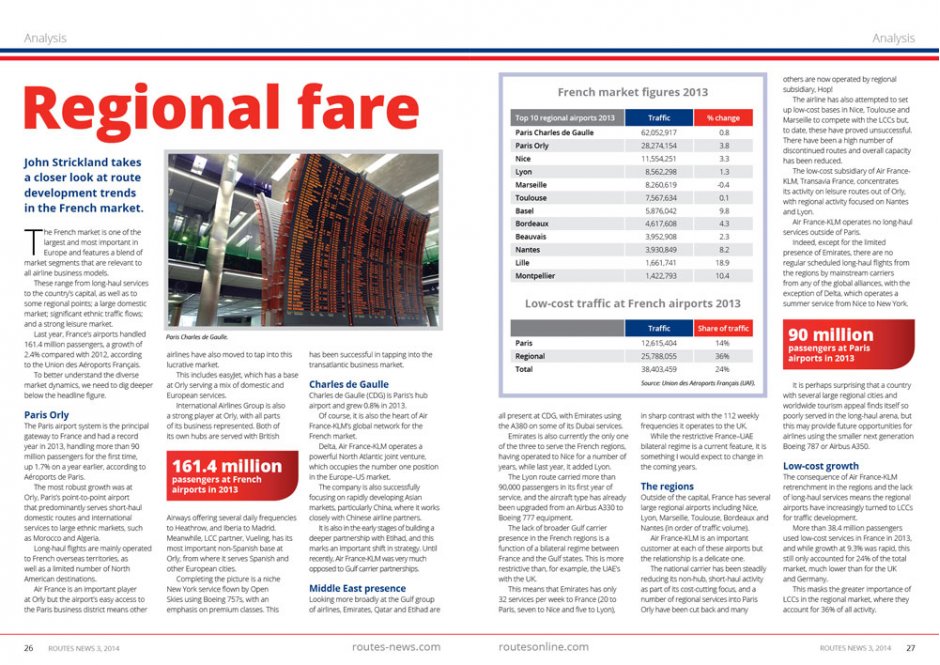ROUTES EUROPE: Industry Interview - Temel Kotil, Chief Executive Officer, Turkish Airlines
FROM THE LATEST ISSUE OF ROUTES NEWS: Turkish Airlines has emerged as one of the fastest growing airlines in the world – Chief Executive Officer, Temel Kotil, outlined its aggressive growth strategy to Martin Rivers for our sister publication, Routes News.
When Istanbul’s third airport is completed, the mega-hub on the European side of the city should have an annual capacity of 150 million passengers. The $30 billion project is, however, still shrouded in political uncertainty, with a court ruling in February blocking construction work until an environmental impact analysis has been conducted. That will almost certainly push the opening date beyond the current, optimistic target of 2018.
With 150 million passengers already taking to the skies across the country last year, Turkey’s political leaders are under no illusions about the urgent need to plan for more growth. Istanbul Atatürk Airport, which will be replaced by the new facility, grew its passenger numbers 14% last year to handle more than 51 million travellers. It is now perilously close to capacity.
Sabiha Gökçen Airport, on the Anatolian side of the city, expanded its traffic by an even more impressive 27%, processing 19 million passengers. All 14 of the Turkish airports that handle more than one million people also grew their traffic in 2013. Much of this growth is driven by flag carrier, Turkish Airlines (THY), which grew passenger numbers 23% in 2013 to 48 million.
Long-standing chief executive, Temel Kotil, expects that figure to balloon to 60 million this year, fuelled by higher frequencies and more than a dozen new routes. “Until 2023, we will not slow down,” he tells Routes News. “Sometimes it is difficult to understand why an airline is growing this much. But we are always under capacity … Istanbul is an excellent place to link Africa to Asia, Africa to Europe, Europe to Middle East.”
Turkey’s rising star as a sixth-freedom intercontinental hub did not come about by chance. In 2002, Turkish airports handled barely one-fifth of their current footfall. Deregulation the following year, combined with part-privatisation of the flag carrier in 2006, allowed the sector to fully exploit Turkey’s geographical advantage.
Seven years ago, Atatürk was not among the world’s 50 busiest airports by traffic. Last year, it ranked number 17. “Around 2007 to 2010, we were pushing to open more destinations with a clear purpose,” Kotil recalls. “We added some African cities that maybe many airlines were not interested in, and we added so many small European cities – people were confused about why we were going there. We knew the strategy would pay back later on, and this is what happened.”
Development of the hub-and-spoke model means that route launches are a frequent event for THY. The airline will add more than a dozen new destinations in 2014, bringing the overall network to 260 cities. Asked what regional white spots he is focusing on, Kotil simply remarks: “We don’t yet cover the whole world.”
Little wonder, then, that the upcoming route launches are a mish-mash of better and less well-known cities across the globe. This year’s confirmed launches include Boston, Montréal, Rotterdam, Catania in Italy, Münster in Germany, Varna in Bulgaria, and Astrakhan and Stavropol in Russia. Countless others are being planned. “In Africa, we have 36 destinations, and about 10 more coming there,” Kotil notes, promising new destinations in Algeria, Egypt, Mali, Eritrea, Benin and Angola. “And still we want more. I believe that Africa is heaven for the future.”
Europe and Asia are already well served and will continue growing apace. But the airline has a more modest presence across the Atlantic, operating just six routes to North America (New York, Washington, Chicago, Houston, Los Angeles and Toronto) and two to South America (Buenos Aires and São Paulo). “We have decisions to go to Mexico, Bogotá, Havana and Caracas already,” Kotil notes. “In North America … San Francisco and Atlanta are in the pipeline.”
The growth will also be driven by higher frequencies. Noting that THY currently operates 1,200 flights per day, Kotil says 2,000 is an optimal figure for a network of its size. “This means we are at half of our matured frequencies,” he insists. “We’re growing about 20% this year on frequencies to existing destinations.”
In the first two months of 2014, more frequencies were announced for Tehran, Basel, Lisbon, Marseille, Budapest, Donetsk and Edinburgh. Not content with its 31 weekly flights to Heathrow and 14 to Gatwick, THY is also adding a third daily service to the UK capital’s secondary gateway. The flag carrier’s twice daily service from Tokyo is its second largest route when measured by Available Seat Kilometres (ASK), but Kotil says he wants to see a third flight added soon. Its New York route is already operated three times daily, making it the largest destination by ASK capacity. “Chicago, LA, Washington DC, Houston, they need to double too,” the chief executive says, rattling off a seemingly endless list of growth targets.
Amid all the talk of expansion, it is tempting to question whether THY might be biting off more than it can chew. But a quick glance over the airline’s financial statements shows little cause for concern.
The flag carrier has been profitable every year since its 2006 privatisation, when the government lowered its stake to 49%. Unlike its sixth-freedom rivals in the Gulf – whose state owners can mask the financial burden of their double-digit expansion – THY is held to task by the country’s sole stock exchange, the Borsa Istanbul. This accountability, Kotil insists, shapes the attitudes of his staff and motivates them to excel at their work.
“Subsidies from government to any company – airline or any commercial activity – is poison. It will kill you,” he warns. “When I became CEO, this place was a government company, then in 2006, it became private, and I saw the difference. In state companies, workers believe the boss is the government. In private companies, employees believe the boss is the passenger. So, in 2006, we changed the boss. We have 60 million bosses today – some of them young kids. We love that. That’s the attitude.”
This private sector mindset is enabling THY to pursue its ambitious growth plan and strive for greater efficiencies. The number of passengers per employee has risen from 1,000 a decade ago to 2,000 today. Wages account for less than 15% of the airline’s overall cost-base, and Kotil has successfully fended off strike action by trade union, Hava-İş. “We agreed on everything,” he says of a new settlement reached in December. “We are happy. We make money, so our workers should also make money. No problem.”
Rather than interfering with the management of the company, the government is credited by Kotil with creating the conditions necessary for growth. Lowering taxes and easing visa restrictions both helped, he says, but liberalising the sector was the biggest game-changer.
Deregulation in 2003 allowed rivals, Pegasus and Atlasjet, to launch domestic services, growing the home market from five million to an expected 44 million passengers this year. THY now provides just 55% of that traffic – much of it through low-cost subsidiary, AnadoluJet – in contrast with the previous monopoly. “Without other operators, there is no way the number of domestic passengers would be 44 million,” Kotil insists. “We need them. They keep me awake!”
However, rapid growth across the sector entails its own set of problems. While Ankara is undoubtedly a pro-aviation government, its slow progress in getting the third airport project off the ground poses challenges for THY in Istanbul. Asked about the new gateway, Kotil is adamant the politicians must decide the future of the country’s infrastructure themselves.
“There are years and years of decisions, and the authorities can do whatever they want,” he says. “But [aircraft] deliveries continue. This year, 37 more machines are coming, and I cannot put them at Atatürk. So this is why we are very heavily going to Sabiha, which is a little bit of a change on our strategy.
“We will focus on Sabiha, focus on Esenboğa [in Ankara], and utilise the slots we have at Atatürk for our premium networks … We can accommodate whatever growth until the new airport is ready,” the CEO says. Sabiha and Atatürk are both now looking at adding new runways.
But while the roadmap for airport expansion is flexible, THY’s fleet growth has been clearly mapped out. Together with AnadoluJet, the mainline unit operates about 235 aircraft, and has orders and options for a further 265 units. Its fleet will total 267 aircraft by the end of this year, and 440 by 2023.
Three-quarters of THY’s aircraft are narrowbodies, and this ratio is likely to be maintained. Its outstanding orders include 89 Airbus A320-family aircraft and 83 Boeing 737s, the vast majority of which are neos and MAXs. Widebody commitments are also evenly split between Airbus and Boeing, with 20 777-300ERs and 17 A330-300s due to be delivered by 2017. Battling constant under-capacity – described as a “nice problem” by Kotil – ensures that new transactions are never far off.
The airline is actively looking to wet-lease more widebodies this year, before placing a follow-up order probably in 2015. Elsewhere within the group, in February, SunExpress – the joint venture between THY and Lufthansa – placed another order for up to 50 737-800s and MAXs.
With so much growth in the passenger fleet, new opportunities are also emerging at Turkish Cargo. The freight division contributes 10% of THY’s income, and Kotil believes this could eventually rise to 15%. “But passenger traffic is growing very fast,” he admits. “It’s hard to catch up.” More likely than not, THY’s competitors in Europe, the Middle East and Africa are thinking just the same thing.
 |
DON'T MISS the latest issue of Routes News which is available at this year's Routes Europe and includes an EXCLUSIVE report on the French aviation industry. Click here to view the digital version of the magazine. |  |





